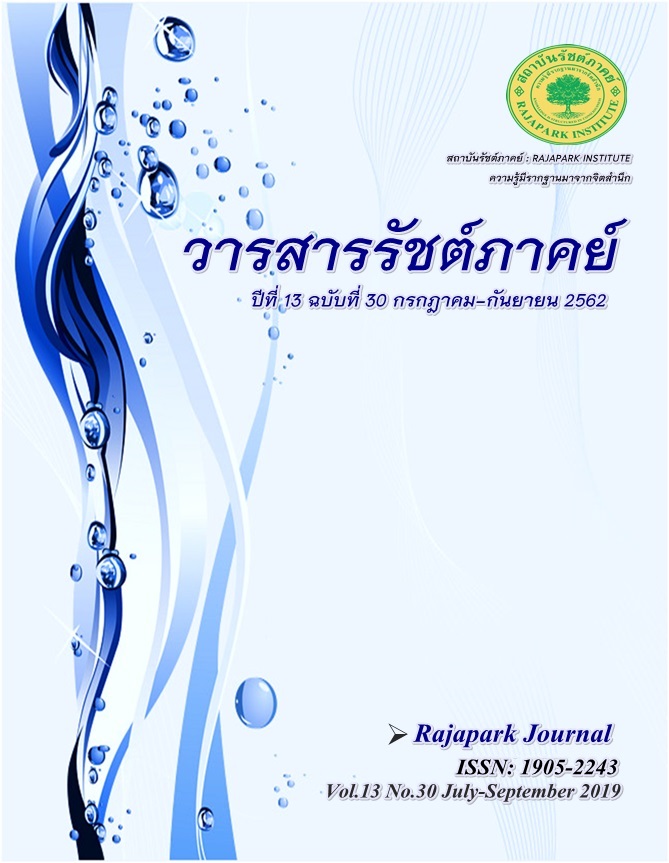The Competencies of Small and Medium Enterprise Directors in Vientiane Capital, Lao People's Democratic Republic
Main Article Content
Abstract
In this dissertation, the researcher has three objectives as follows: to study (1) the competencies of the directors of small and medium enterprises (SMEs) in Vientiane Capital, Lao People’s Democratic Republic (Laos); to examine (2) factors affecting the competencies of these directors; and to propose (3) desirable competencies for directors in consonance with the context of the SMEs under study. The sample population consisted of 400 SME directors in Vientiane Capital, Laos. The research instrument was a questionnaire. The statistics used in collecting data was a questionnaire. The statistics used in data analysis were frequency, percentage, mean, and standard deviation. The hypothesis test was conducted using t test, F-test, and multiple regression analysis. Findings are as follows: (1) The competencies of the directors under study were found to be at a high level. (2) The factors affecting the competencies of the directors under investigation found that the factors of gender, age, experience, and training affected competencies at the statistically significant level of .05. (3) The study of the recommendations concerning the desirable competencies for directors in consonance with the context of SMEs found the desirable competencies for directors to be the following factors: personal capabilities; administration; and adjustment. It could be written in the following equation.
The desirable competencies for directors in consonance with the context of SMEs in Vientiane Capital, Laos = .920 + .078 (personal capabilities) + .046 (administration) + .147 (adjustment)
Article Details

This work is licensed under a Creative Commons Attribution-NonCommercial-NoDerivatives 4.0 International License.
Views and opinions appearing in the Journal it is the responsibility of the author of the article, and does not constitute the view and responsibility of the editorial team.
References
Bouphan, J., Bouphan, P. & Kompor, P. (2011). Factors Influencing the Professional Working Performance of Dentists at Community Hospitals of the Public Health Region 12. KKU Research Journal (Graduate Studies), 16(6), 679-692.
Car, L. T., Kyaw, B. M., & Atun, R. (2018). The role of eLearning in health management and leadership capacity building in health system: a systematic review. Human resources for health, 16(1), 1-9.
Cunningham, J., Salomone, J., & Wielgus, N. (2015). Project Management Leadership Style: A Team Member Perspective. International Journal of Global Business, 8(2), 27-54.
Department of Finance, Ministry of Finance, Laos. (2016). The impact on the internal management of small businesses of entrepreneurs. Vientiane: Department of Tax, Ministry of Finance, Laos.
Department of Internal Trade, Ministry of Industry and Trade. (2017). International Trade Statistics. Vientiane: Ministry of Industry and Trade.
Giannetti, D., Pedrazzani, A., & Pinto, L. (2018). Personal Ambitions, Expertise, and Parties’ Control: Understanding Committee Assignment in the Italian Chamber of Deputies. Parliamentary Affairs, 72(1), 119-140.
Hantrakul, N. (2011). Management Factors Affecting the Development of the Management Competencies of Top-Level Executives of Public Limited Companies in the Property Development Sector. Master of Business Administration Thesis, Ramkhamhaeng University.
Holland, C. H., Szalai, B. & Saez-Rodriguez, J. (2019). Transfer of regulatory knowledge from human to mouse for functional genomic analysis. bioRxiv, 1-13. doi: https://doi.org/10.1101/532739
Karakarn, S., Inthapichai, S. & Phontiem, W. (2016). The Model of Career Development for First Line Management in Thai Automotive Spare Parts Industry for the Entry of ASEAN Ecomomic Community. The Journal of KMUTNB., 26(3), 507-516.
Keophilavong, T., Widyawan & Rizal, M. N. (2019). Quality of Service of Protocols Performance Evaluation for Internet of Thing Applications Development Using Low-Cost Devices. Proceedings of the 2019 2nd International Conference on Information Science and Systems, 166-170.
Khasasin, R., Piriyakul, R., & Khantanaph, N. (2016). Firm Performance and Entrepreneurial Competency, Competitive Scope and Firm Capability. Kasem Bundit Journal, 17(1), 1-21.
Kongmanila, X., & Takahashi, Y. (2009). Inter-firm Cooperation and Firm Performance: An Empirical Study of the Lao Garment Industry Cluster. International Journal of Business and Management, 4(5), 3-17.
Koopman, E. G., & Dobri, C. (2017). Making the most of competency assessment. Journal of Obstetric, Gynecologic & Neonatal Nursing, 46(3), S2-S3.
Lucas, R., Goldman, E. F., Scott, A. R., & Dandar, V. (2018). Leadership development programs at academic health centers: results of a national survey. Academic Medicine, 93(2), 229-236.
McClelland, D. (1973). Testing for Competency Rather than for Intelligence. American Psychologist, 28(1), 1-14.
Moolwong, D. (2010). Factors Influencing Competencies and the Development of a Training Curriculum for the Enhancement of Competencies of Manufacturing Supervisors at a Hard Disk Drive Industrial Factory. Doctor of Philosophy, Ramkhamhaeng University.
Nash, R., Chalmers, L., Stupans, I. & Brown, N. (2019). Developing Lifelong Learning Skills: Using a Traffic Light Report to Promote Competency Standards and Self-Assessment Among Pharmacy Undergraduates. Ensuring Quality in Professional Education, Volume I, 209-240.
National Statistical Center, Laos. (2017). Development of Small and Medium Enterprises in Laos. Vientiane: National Statistical Center, Laos.
Phosrithong, N. (2007). Performance model of the head of child development center Local government Organization Department of Local Administration Ministry of the Interior. Bangkok: Faculty of Science and Technology, Suan Dusit Rajabhat University.
Rattanasiraprapa, N. (2014). The School Administrators’ Competencies Affecting the World-Class Standard Schools’ Characteristics Under Office of The Basic Education Commission, Veridian E-Journal, 7(3), 507-528.
Thepkam, S. (2014). The development of administrators’ capacities in the schools under the jurisdiction of the Office of Basic Education Commission in the upper northern Thailand. Journal of Social Academic, 7(1), 1-12.


